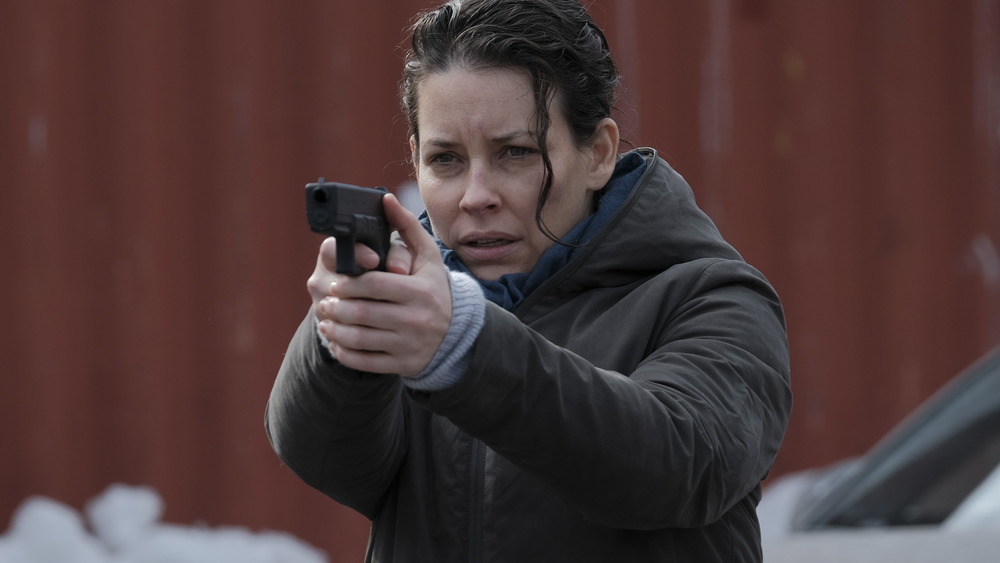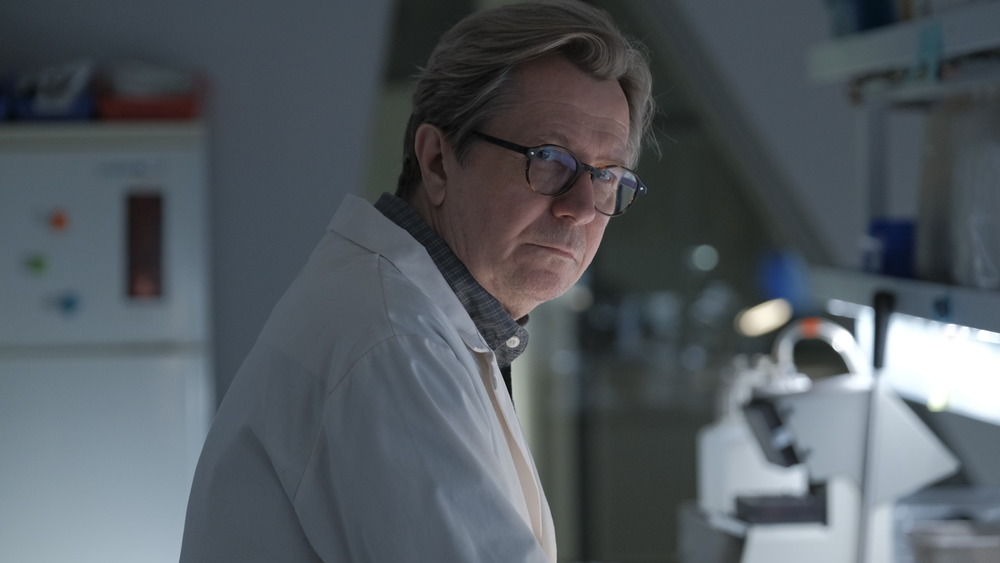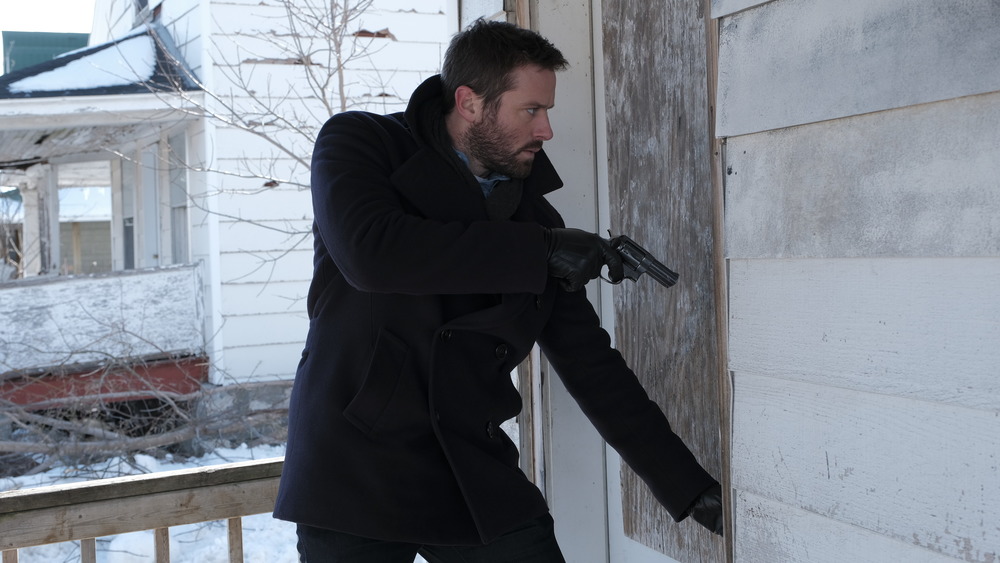Crisis Review: Traffic Jam
A serviceable if undistinguished movie of the week that longs to be the Traffic of opioids, writer/director Nicholas Jarecki's Crisis wears its heart on its sleeve. This can be both a good and a bad thing, as the film casts a wide net putting faces to tales about the human toll behind the headlines — but despite capable performances from stars like Gary Oldman and Evangeline Lilly, it paints with the broadest of strokes and the most clichéd of characters.
The drama's main story follows Jake Kelly (Armie Hammer), an undercover DEA agent working to break up a drug trafficking operation on the Canadian border. Although he isn't quite a bad lieutenant, his methods and frequent fits of rage depict an officer on the edge, and there's good reason for that — his sister Emmie (Lily-Rose Depp from Yoga Hosers) is a full-blown addict at rock bottom.
Meanwhile, architect Claire Reimann (Evangeline Lilly) is grappling with her own opioid recovery — which may or may not have blinded her from the downward spiral of her high school athlete son (Billy Bryk from Wynonna Earp), who is found dead in what's believed to be a drug-involved incident. This sets Reimann on a mission to follow the supply chain to the top and get revenge on the kingpin.
The third (and most interesting) story is focused on Dr. Tyrone Brower (Gary Oldman), a science professor at a private university who oversees a drug testing lab and is accustomed to rubber-stamping the products of a big pharmaceutical company currently in trials for "Klaralon," a fictional pain pill that will supposedly cure all the wrongs of opioids by being completely non-addictive. With his lab rats telling him otherwise (it's actually three times worse) and Klaralon on the verge of going to market, Brower finds himself at a crossroads and considers becoming a whistleblower.
Like Steven Soderbergh's 2000 Oscar winner Traffic, this film hopes to expose a nationwide epidemic by portraying a wide swath of people impacted in horrifying ways. But whereas Traffic was shot in a raw style that put you on the frontlines, Crisis is content to let you keep your distance. Where Soderbergh's film featured unexpected castings and banter that moved the plot along without showing its seams, Crisis features characters you've seen before, prone to clunky speeches where they talk like they're speaking not for themselves, but for everyone in their profession ("What are we here to do?" Kelly asks his superior, who replies: "Our job, as mandated by the people"). Traffic explored the tiny, hollow victories in an unwinnable war that can either frustrate or sustain a person; Crisis is content to throw up its hands and come to the conclusion that drugs are bad.
At the top of this crime ring is a man called "Mother" (Guy Nadon), which was a funny irony when Sneakers went for the same chuckle with Dan Aykroyd in 1992. The Hammer and Lilly storylines eventually coalesce around Mother, but oddly enough Oldman's Dr. Brower storyline is left on its own little island, with the implied connection being that the failure of his efforts would only make things worse for overwhelmed law enforcement and parents.
Ethics in the lab
But the biggest flaw in Crisis might just be its timing. The movie seems determined to call your attention to a national... well, crisis, but as it is released, it's hard to imagine anyone who isn't fully aware of the raging misuse of drugs like oxycodone, fentanyl, and heroin. It has been extremely well-documented, as has the case of Purdue Pharma, which one could assume is something of an inspiration for the Oldman storyline. But it was the late 1990s when pharmaceutical companies began reassuring the medical community that patients would not become addicted to opioid painkillers, leading to a massive increase in prescriptions, and by 2017 the U.S. Department of Health and Human Services was declaring a public health emergency. While the problem may still be far from over, Crisis feels like it's about a decade late.
Speaking of timing, now isn't exactly the best time to be in the Armie Hammer business, and it's likely that many folks will avoid Crisis for exactly that reason. But looking beyond the elephant in the room, Crisis is a stark reminder of why Hammer's public exile isn't resulting in much hand-wringing over the loss of a great actor. He spends Crisis in one mode, storming and barking at everyone he comes into contact with, and seems to think that dropping an f-bomb is the most powerful tool in an actor's arsenal. It's amazing that such a noisy performance can simultaneously be so bland.
Then there's Oldman, one of the greatest actors of our time, who seems here like a starving man trying to make his soup stretch beyond one meal. His character undergoes a profound shift in ethics, but the script never shows us why. He yearns to expose the dangers of big pharma, but the script shuts him down before he gets to speak. His scenes with the usually terrific Greg Kinnear (as the college dean) are particularly frustrating, because both men seem to be speaking as their professions, rather than as two human beings. Wasting Gary Oldman should be considered a federal crime — but since the actor serves as executive producer, he has no one to press charges against but himself.
Nowhere is this more painful than in a clunky scene involving Dr. Brower meeting with an FDA rep (played by rapper Kid Cudi). It's your standard I'm-thinking-about-taking-on-a-powerful-entity scene, set in a public park with two characters sitting near each other and constantly looking around to make sure they're not being watched. The FDA guy says things like "What you're doing now may be the most important thing you ever do," and Brower screams back "You're a bureaucrat with a plastic badge!" All the while, this supposedly tense one-on-one scene keeps cutting around Kid Cudi's line delivery using every painfully obvious editing trick in the book (shots from behind him, bad ADR), then pulls back at the end to reveal that somebody has been taking pictures of them from a laughably obvious position. Much like the photographer, this film is not very good at concealing itself.
Dropping the Hammer
If there are bright spots in Crisis, they lie in two eye-opening performances. Although Evangeline Lilly has certainly done her share of dramatic acting over the years, the grieving-mother-seeking-revenge storyline and recovering addict angle gives her some new muscles to stretch, and she does so admirably. There's a powerful scene with Claire grieving her son in which Lilly walks into his room, puts on his hoodie, and collapses on the bed, clinging to his memory. She also brings an interesting complexity to the many scenes when she's in over her head, a suburban mother tracking drug dealers and trying to take pictures of their VIN numbers in dark parking lots.
Also worth mentioning is Lily-Rose Depp, whose role as a junkie could not be any more paint-by-numbers, yet she brings a unique energy to her scenes. While it's doubtful that more scenes with Hammer would've gone anywhere worth watching, you can't help but wish the movie would follow her storyline for a while and stop being so dependent on his.
Crisis ends very abruptly, with none of the characters receiving endings that are consistent with the movie we just watched. It's another in a myriad of ways that the film exists, seems earnest, but falls short. Ultimately, it's a script that feels like it was designed to be profound, but instead keeps getting stuck in a Traffic jam.


